| |||||
| Decades: | |||||
|---|---|---|---|---|---|
| See also: | Other events of 1872 History of China • Timeline • Years | ||||
Events from the year 1872 in China .
| |||||
| Decades: | |||||
|---|---|---|---|---|---|
| See also: | Other events of 1872 History of China • Timeline • Years | ||||
Events from the year 1872 in China .

The Taiping Rebellion, also known as the Taiping Civil War or the Taiping Revolution, was a civil war in China between the Manchu-led Qing dynasty and the Hakka-led Taiping Heavenly Kingdom. It lasted from 1850 until the fall of Tianjing in 1864, although the last rebel army was not wiped out until August 1871. The conflict resulted in approximately 20 to 30 million deaths, approximately one-tenth to one-twentieth of China's population at the time. The established Qing government won decisively, although at great cost to its fiscal and political structure.
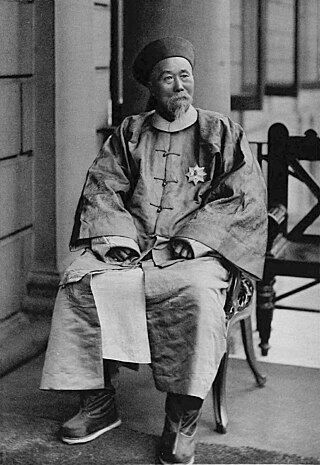
Li Hongzhang, Marquess Suyi was a Chinese statesman, general and diplomat of the late Qing dynasty. He quelled several major rebellions and served in important positions in the Qing imperial court, including the Viceroy of Zhili, Huguang and Liangguang.

The Xianfeng Emperor, also known by his temple name Emperor Wenzong of Qing, personal name Yizhu, was the eighth emperor of the Qing dynasty, and the seventh Qing emperor to rule over China proper, reigned from 1850 to 1861. During his reign, the Qing dynasty experienced several wars and rebellions including the Taiping Rebellion, Nian Rebellion, and Second Opium War. He was the last Chinese emperor to exercise sole power.
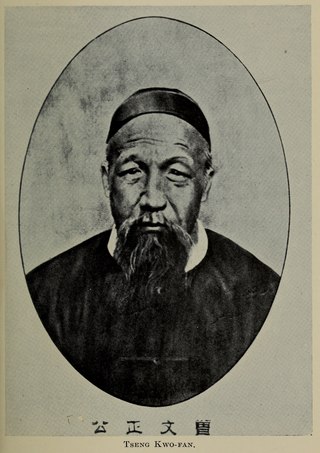
Zeng Guofan, Marquis Yiyong, birth name Zeng Zicheng, courtesy name Bohan (伯涵), was a Chinese statesman and military general of the late Qing dynasty. He is best known for raising and organizing the Xiang Army to aid the Qing military in suppressing the Taiping Rebellion and restoring the stability of the Qing Empire. Along with other prominent figures such as Zuo Zongtang and Li Hongzhang of his time, Zeng set the scene for the Tongzhi Restoration, an attempt to arrest the decline of the Qing dynasty. Zeng was known for his strategic perception, administrative skill and noble personality on Confucian practice, but also for his ruthlessness in repressing rebellions.
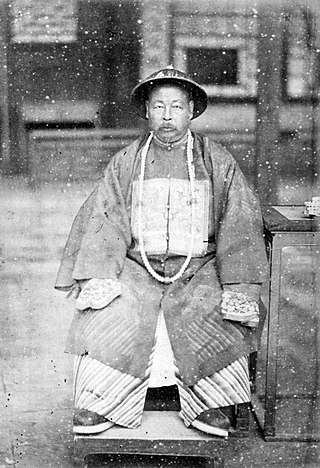
Zuo Zongtang, sometimes referred to as General Tso, was a statesman and military leader of the late Qing dynasty.
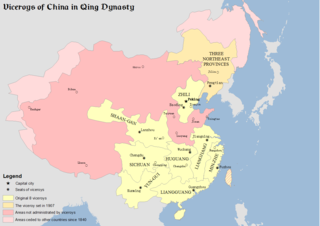
Zongdu were the managers supervising provincial governors in Ming and Qing China. One viceroy usually administered several provinces and was in charge of all affairs of military, food, wages, rivers, and provincial governors within their region of jurisdiction. Viceroys was appointed by and directly reported to the Emperor.

Guo Songtao was a Chinese diplomat and statesman during the Qing dynasty. He was among the first foreign emissaries to be sent abroad by the Qing government, as a result of the Tongzhi Restoration.

The Tongzhi Restoration was an attempt to arrest the dynastic decline of the Qing dynasty by restoring the traditional order. The harsh realities of the Opium War, the unequal treaties, and the mid-century mass uprisings of the Taiping Rebellion caused Qing officials to recognize the need to strengthen China. The Tongzhi Restoration was named for the Tongzhi Emperor, and was engineered by the young emperor's mother, the Empress Dowager Cixi (1835–1908). The restoration, however, which applied "practical knowledge" while reaffirming the old mentality, was not a genuine program of modernization. Academics are divided as to whether the Tongzhi Restoration arrested the dynastic decline or merely delayed its inevitable occurrence.
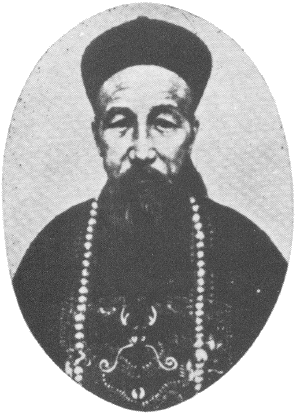
The Xiang Army or Hunan Army was a standing army organized by Zeng Guofan from existing regional and village militia forces called tuanlian to contain the Taiping Rebellion in Qing China. The name is taken from the Hunan region where the Army was raised. The Army was financed through local nobles and gentry, as opposed to through the centralized Manchu-led Qing dynasty. The army was mostly disbanded by Zeng after the re-capture of the Taiping capital at Nanking.

Zeng Guoquan, courtesy name Yuanfu, art name Shuchun, was a Chinese official and military leader of the late Qing dynasty. He was the ninth brother of Zeng Guofan, a prominent statesman and general, and a descendant of the philosopher Zengzi. He served in the Xiang Army, a standing military force organised by his brother to counter the Taiping rebels, and was nicknamed "Ninth Marshal" (九帥). He was known for his expertise in siege warfare, particularly the use of trenches, hence he was also nicknamed "Zeng the Iron Container" (曾鐵桶). During the conquest of Tianjing (Nanjing), the capital of the Taiping Heavenly Kingdom, Zeng was notorious for condoning massacres of the city populace, which resulted in him being called "Zeng the Butcher" (曾屠戶).
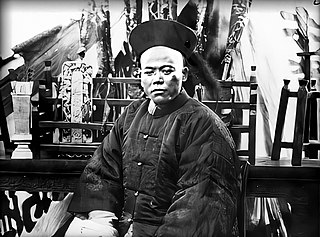
Cheng Xueqi (Chinese: 程學啟; courtesy name Fangzhong 方忠; born in Tongcheng, Anhui, was a general of the Taiping Rebellion who surrendered to the Qing dynasty in 1861 with Ding Ruchang. He was an eminent Han Chinese official and a Captain General in the army of the late Qing dynasty. He led the Huai Army to fight effectively against the Taiping rebels and helped to restore the stability of Qing, along with other prominent figures, including Li Hongzhang and Zeng Guofan, setting the scene for the successful defense of Shanghai and the Suzhou Massacre POW Incident. The Tongzhi Emperor praised Cheng as "intelligent and brave".

Sigh of His Highness is a Chinese historical television series based on the life of Prince Gong, an influential Manchu prince and statesman of the late Qing dynasty. The series was directed by Li Wenlong and starred Chen Baoguo as Prince Gong. It was first broadcast on Sichuan TV in China in 2006.
Events from the year 1860 in China.
Events from the year 1861 in China.
Events from the year 1857 in China.
Events from the year 1852 in China.
Events from the year 1862 in China.
Events from the year 1863 in China.
Events from the year 1864 in China.
Events from the year 1865 in China.